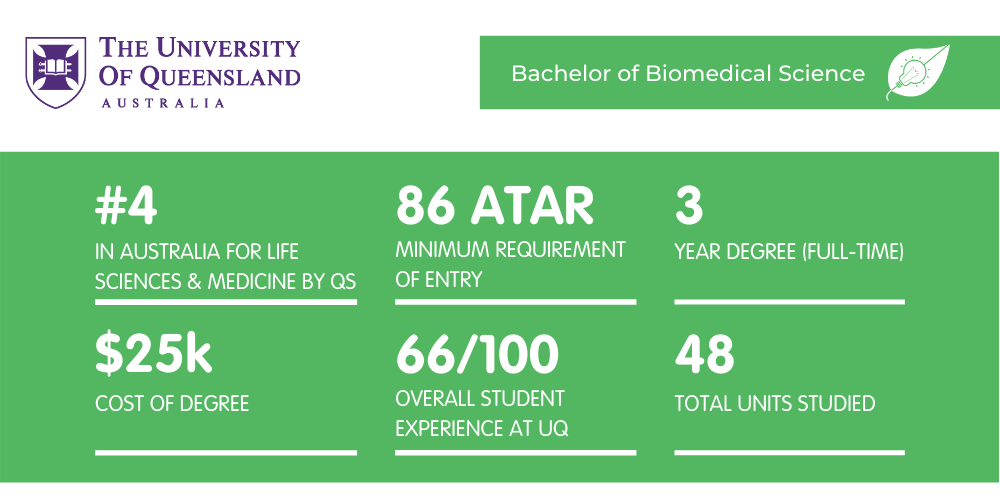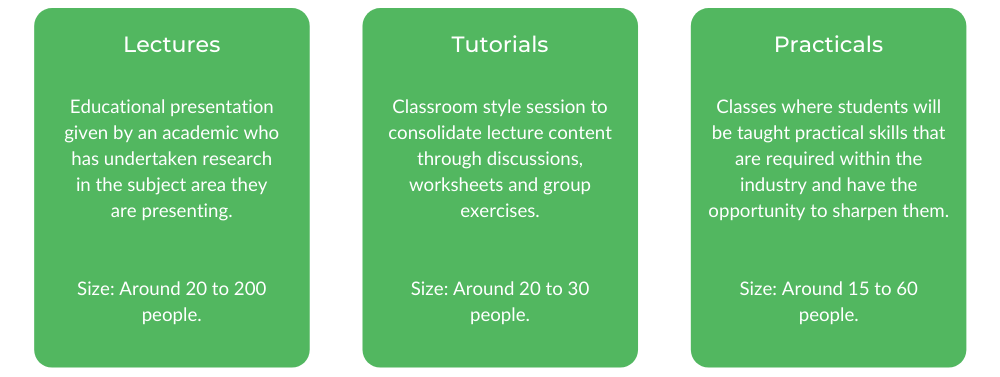Are you looking for a pathway into studying medicine? Or, perhaps, you’re interested in becoming a biomedical scientist? Then, consider a Bachelor of Biomedical Science at UQ!
This article gives you all the essentials about this course from the core units, career options to the teaching format, so you can decide if UQ Biomedical Science is the degree for you.
Want to know more? Just read on!
What is a Bachelor of Biomedical Science at UQ?
Core Units for this Degree
How to Get into a Bachelor of Biomedical Science at UQ
What’s the Teaching Format?
What’s the Faculty and Culture Like?
What is a Bachelor of Biomedical Science at UQ?
A Bachelor of Biomedical Science combines a broad range of sciences, including human biology, chemistry, immunology and anatomy, that all underpin medicinal practice. This course is designed to teach students hands-on skills, with many of its units taking place in the wet laboratory.
In the third year of study, students choose 10 elective units and get the chance to specialise in their own interests such as regenerative medicine, neuroscience and genomics.
Can this degree be studied in conjunction with another or completed as Honours?
At UQ, students can study a Bachelor of Biomedical Science as a single degree. However, students can also choose to study the double-degree program, Bachelor of Biomedical Science/Science, and further expand their interdisciplinary knowledge.
For students nearing the end of their degree, an option to study an additional year-long Honours program is available. This is provided that they have an overall GPA of 4.0 and a GPA of at least 4.5 for eight level 3 units.
Check out more details for the Honours program here!
Career Pathways
Although many Biomedical Science students aim to study medicine as a postgraduate course, there are many career options for its graduates, which include:
-
- IVF scientist
- Biomedical engineer
- Prosthetic technician
- Embryologist
- Medical laboratory scientist
Core Units for this Degree
There are 10 core units in a Bachelor of Biomedical Science at UQ:
These are broad units that teach the foundational knowledge in biology, chemistry, scientific method and statistics. This knowledge will help guide students in their second-year and third-year electives.
Most core units are based in biology. The first-year units Genes, Cells and Evolution and Cells to Organisms explore the evolution and function of cells in complex organisms.
Second-year units centre on the cellular structures and interactions of human organs through in-laboratory observation; these units are Molecular Cell Biology I, Genetics and Integrative Cell & Tissue Biology.
The third-year unit Biomedical Science consolidates the entire course content by exploring the ethical and skill-related context of biomedical science.
Are there any majors?
While there are no majors in this course, students choose 14 elective units during their second and third year. These further specialise into areas including biochemistry, immunology, neuroscience and pharmacology.
Elective units you may choose to study include:
How to Get into a Bachelor of Biomedical Science at UQ
The ATAR cut-off for guaranteed entry into a Bachelor of Biomedical Science at UQ is 86.00.
Alternate Pathways
If your ATAR does not meet the cut-off, there are a couple of alternatives. The Subject Incentive Scheme offers up to 5 adjustment points if you have studied and achieved a grade of C or higher in Mathematics Extension 1 or 2 or a Language other than English.
In addition, current university students, such as someone studying a Bachelor of Science, have the option to internally or externally transfer to this course program.
What are the prerequisites?
Although there are no additional assessments for entry into this course, there are 3 prerequisite subjects for to be mindful of:
-
- Queensland Year 12 (or equivalent) General English subject (Units 3 & 4, C)
- Mathematical Methods (Units 3 & 4, C)
- One of Biology, Chemistry or Physics (Units 3 & 4, C)
Scholarships
Being granted a scholarship can be a great source of financial assistance and addition to your CV.
For Biomedical Science students who also study a Bachelor of Science, the Liveris Academy Merit Scholarship Scheme and Stavros Niarchos Foundation Scholarship are two great scholarships that are respectively valued at $10,000 for each year and $9,000 for each year.
What’s the Teaching Format?
At UQ, the teaching format is structured into semesters. Biomedical Science students attend a combination of lectures, tutorials and practicals.
Class Structure
Lectures
Lectures are integrated into every unit in the course program and are generally one hour long. These cover the weekly topics of the unit, where the lecturer will go through slides and teach the general content.
The lecture content often increases in difficulty as the semester continues. In the first year, class sizes can go up to a couple hundred, however, it can dwindle to less than 20 students in later years.
Tutorials
Tutorials are small-scale classes where students can receive more personalised help from the tutor.
In most tutorials, students work through practice questions and other theoretical work based on the lecture content. Tutorials are 1 to 2 hours long and have around 20 to 30 students.
Practicals
Practicals are also a large component for Biomedical Science where students can get hands-on experience in scientific practice. These usually take place in a wet laboratory, where various biological matter and chemicals are analysed in experiments.
Since practicals are important in strengthening students’ learning experience, these classes are longer and usually go for 3 hours. Class sizes can be anywhere from 15 to 60 people, depending on the difficulty of the unit.
How much time do you spend in class?
Contact hours in a Bachelor of Biomedical Science at UQ are quite high as there is a focus on hands-on experience. So, there are around 20 contact hours for a full-time study workload!
What are the assessments like?
The main assessments in a Bachelor of Biomedical Science at UQ are exams, written assignments and quizzes.
All units have an exam component. This is usually a final exam, which holds a 50-60% weighting. However, this can also be split into a mid-semester and final exam.
There are often 4-5 smaller assessments throughout the semester. Written assignments can be anything from laboratory reports and essays, which often get students to personally analyse on a practical component.
Quizzes are usually scattered through the semester and are small assignments that check how well the student is learning.
Skills That You Refine and Learn
The largest skill you will refine in Biomedical Science is your practical skills. This encompasses your ability to conduct reliable and effective research in a laboratory by following proper scientific procedures. This is integral in scientific research as the accuracy of your measurements, data collection and other components will affect your final results.
Analytical skills can relate to the evaluation of your own research as well as other findings in scientific research. Through the mix of theoretical work and laboratory classes, you’ll learn to discern potential errors or variations in firsthand or secondary experiments.
Lastly, a conceptual knowledge of human biology is refined throughout the course program through the core units and electives. By the last year of study, you’ll have a strong grasp of biological concepts such as cell proliferation and other functions.
What’s the Faculty and Culture Like?
Faculty
The School of Biomedical Science includes a range of award-winning lecturers, state-of-the-art labs and resources. In addition, the students are always super friendly and it is always easy to make friends in a new class!
The UQ Biomedical Science building also has modern facilities including Queensland’s largest anatomical prosection and skeletal teaching collection. For example, the Gross Anatomy Facility has two large temperature and humidity controlled anatomy laboratories, and high-end Audio Visual systems.
Culture
The UQ Association of Biomedical Students (UQABS) is a great place to start if you’re looking to meet new people studying the same degree. UQABS holds various offline and online events such as Games nights, “Lab Coat Pub Crawls”, workshops for Med School applications, Networking nights and their very first Biomedical Symposium & Gala Ball is being held in 2021!
In addition, UQ WISA is a student-led society that has a large community of female Science, Technology and Engineering students. Their social events include panel talks, cocktail evenings, and even Aquarium visits to the SEA LIFE Sunshine Coast Aquarium!
Support Programs
UQ offers mentoring programs for first-semester students to ease the transition from school to university life. Throughout the semesters, there are also study-skills workshops that offer general study guidance for students, so you’ve got some guidance as you navigate your first year of uni!
Lynn Chen is a Content Writer at Art of Smart Education and is a Communication student at UTS with a major in Creative Writing. Lynn’s articles have been published in Vertigo, The Comma, and Shut Up and Go. In her spare time, she also writes poetry.






